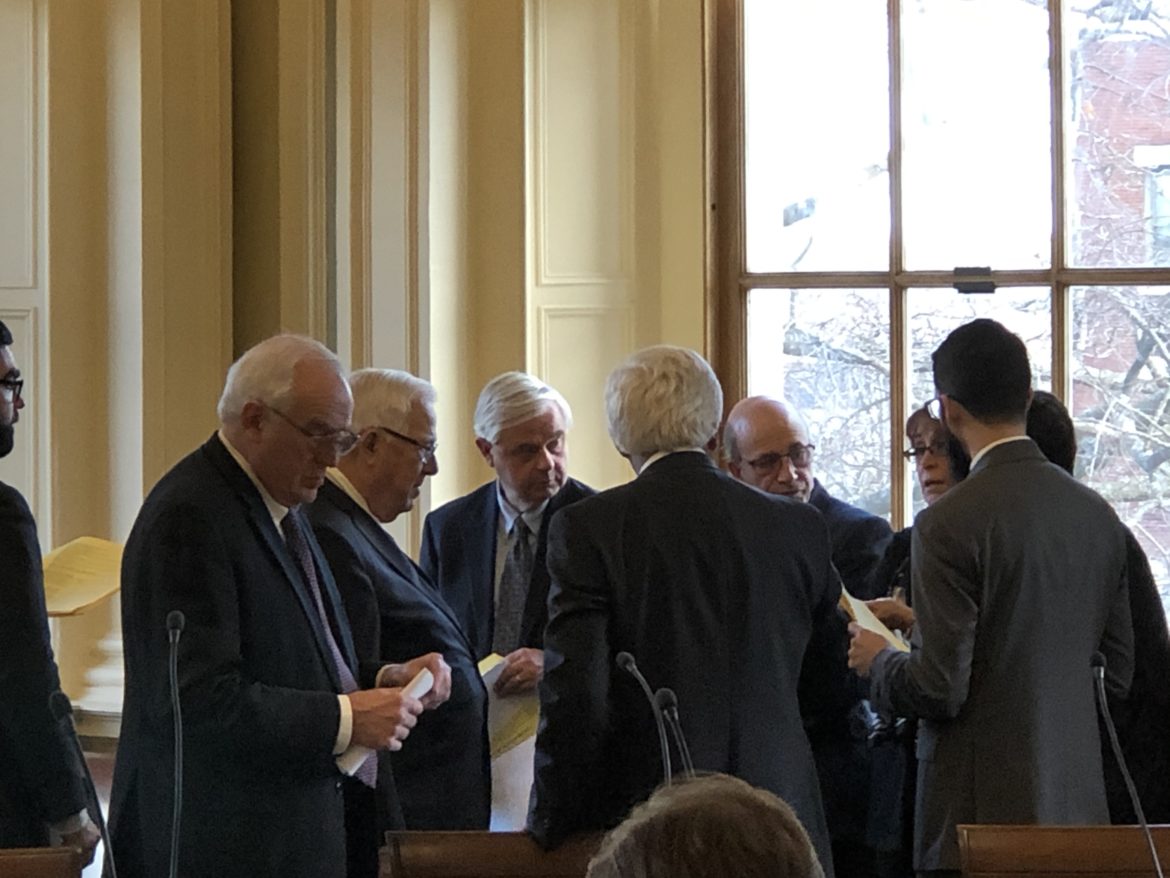By PAULA TRACY, InDepthNH.org
CONCORD – The New Hampshire Senate
voted Thursday to override Republican Gov. Chris Sununu’s veto on net metering.
The vote was 17-7 on Senate Bill 159.
All 14 Democrats were joined by Senators Jeb Bradley, R-Wolfeboro, Harold French, R-Franklin, and John Reagan, R-Deerfield, to override the governor’s veto.
In his veto message, the governor argued it will cost ratepayers millions of dollars.
The bill would expand the net metering limit from 1 to 5 megawatts, and was amended in the House to make a significant concession to the governor’s concerns, increasing from 20 to 50 percent of the amount of electricity that would stay in a municipal or business array rather than being sold to power companies.
It next goes to the House of Representatives where it also needs a 2/3 majority to override the veto.
Senate Majority Leader Dan Feltes, D-Concord, who is running for governor, said, “I’m grateful that, in advance of town meeting day, we achieved a bipartisan Senate vote to override Governor Sununu’s veto of SB 159, the third bipartisan net metering proposal that he vetoed, this one meeting him more than halfway.
“It’s time to finally move forward with a comprehensive net metering plan -not pick energy winners and losers.”
Telemedicine
Elderly people and those who live far from their healthcare
provider may be able to call instead of travel for an appointment under a bill passed
in the Senate on Thursday.
Senate Bill
555, relative to telemedicine coverage, was unanimously passed, allowing for
doctors and medical care providers to be able to bill insurance for such care.
It goes to the House next.
State Sen.
Jay Kahn, D-Keene, who sponsored the measure, said the bill was particularly
important in rural areas and the current lack of access to telemedicine in the
state is “atrocious.”
There is a
cap in the bill that would not allow for doctors to charge insurance companies
more than a face-to-face visit. The bill, he said, establishes parity for
healthcare providers and could help residents stay healthy.
LCHIP
Increase Approved
To support
an annual increase of an estimated $1.5 million for the state’s Land and
Community Heritage Investment Program, the Senate voted overwhelmingly to
support an increase of $10 for each transfer, from $25 to $35 at the registry
of deeds.
Last year,
a similar measure was vetoed by Sununu because he claimed it was a new tax.
Bradley
offered an amendment that would instead withdraw $250,000 from the state’s
general fund.
He said
that the bill as written would not “get across the goal,” to the
governor’s approval but that the governor’s office had been consulted on the
idea of the general fund and it would be something more likely to pass his
desk.
“Something’s
better than nothing,” Bradley said.
But state Sen. Lou D’Allesandro, D-Manchester, said he worried that revenue has
not met the plan and there would not be money in the general fund for this
worthy program which he said: “People believe in.”
State Sen.
David Starr, R-Franconia, said he supported the original bill noting that
Berlin has an “incredibly cool mini Gothic Cathedral” which would
have been made into a parking lot were it not for LCHIP funds.
“This is a necessity to keep New Hampshire New Hampshire,” he said.
Sen. Bob Giuda, R-Warren, also opposed the floor amendment and supported the
bill saying that tapping the general fund was the wrong way to go.
He said the additional $10 on a quarter-million-dollar
transfer of a property is “negligible.”
An
amendment to the bill would allow registrars to accept donations to the LCHIP
program. The bill next goes to Senate Finance.
After the vote, prime sponsor Sen. Martha Fuller Clark, D-Portsmouth, said preserving New Hampshire’s historical and natural beauty is a top priority.
“While this proposed increase to the fee may be small, it would provide an additional $1,500,000 per year in sustainable funding for LCHIP – unlike competing proposals for voluntary donations or potential one-time budget spending in the next biennium.”
Dogs at
Brewpubs
The Senate
also passed a measure that would allow dogs on outdoor patios at brewpubs. But
within Senate Bill 450 was an amendment that would allow municipalities to
opt-out of that provision. It next goes to the House.
DHHS Access
To Data
A bill that would strengthen privacy and allow people to remain anonymous as
information is accessed on their prescription history as it relates to
understanding the opioid crisis was passed.
Senate Bill
676-FN must now head to the Senate Finance Committee before being considered in
the House.
Expanding
Cannabis Access
On a voice vote, the Senate passed SB 697-FN which would allow qualifying patients to access all Alternative Treatment Centers in the state where cannabis or marijuana is dispensed for therapeutic purposes.
The bill must now go to the Senate Finance Committee.
Enhanced DWI Penalties
The Senate passed a bill that would allow for enhanced penalties to be imposed for those convicted of negligent homicide who had a prior conviction for driving under the influence of alcohol.
The bill was inspired by the family of
Tyler Shaw, who lost his life to a motorist at the corner of Logging Hill Road
in Bow.
The bill would allow the penalty to be raised from 10 to 20 years.
State Sen. Melanie Levesque, D-Brookline, said people “need to recognize
the severity of their actions.”
But Starr said Senate Bill 743-FN seemed “kind of stiff to me.”
Levesque said, “It is a long time, but there is judicial discretion.”
Sen. Bob Giuda, R-Warren, who lost a brother to a drunken driver, said he does not believe enhancing penalties will solve the problem of alcoholism.
“We’ve got to look at something better than that,” Giuda said. The bill now goes to the House.
Seat Belts
A bill that would require drivers and
those age 18 and under in a vehicle to wear seat belts was tabled without
discussion.
Senate Bill 609, relative to passenger restraints, is now laid on the table and
can come up later in the session.
Motor Carrier Licenses
A crash in July on Route 2 in Randolph that killed seven motorcyclists who were members and friends of the Jarheads Motorcycle Club was the impetus for Senate Bill 738-FN which passed the Senate.
It would allow the state to remove from the road any out-of-state motor carrier license for default, noncompliance or nonpayment of fine.
A West Springfield, Mass. driver has been accused of killing the motorcyclists when he crashed into them with his truck.
Massachusetts authorities said Volodymyr Zhukovskyy should not have been driving because he had a suspended license after an OUI arrest in Connecticut but the Massachusetts motor vehicle department failed to put that information into computers used by police.
The case has yet to go to court. The House will consider the bill next.





